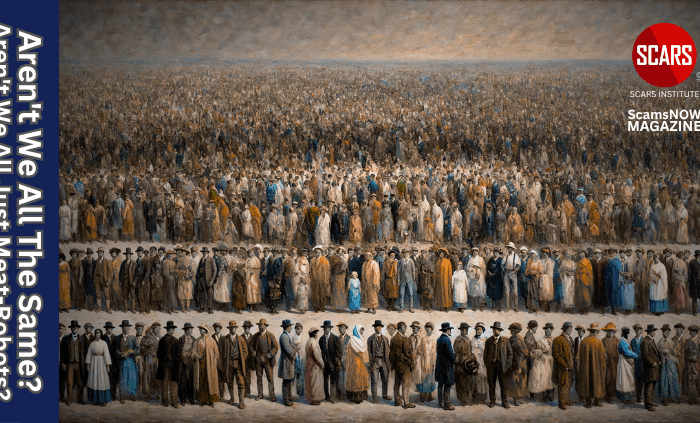The Similarity/Attraction Theory And Relationship Scams
Another Example of How Our Own Psychology Heavily Influences Our Susceptibility to be Deceived!
Primary Category: Psychology of Scams
Authors:
• Vianey Gonzalez B.Sc(Psych) – Licensed Psychologist, Specialty in Crime Victim Trauma Therapy, Neuropsychologist, Certified Deception Professional, Psychology Advisory Panel & Director of the Society of Citizens Against Relationship Scams Inc.
• Tim McGuinness, Ph.D., DFin, MCPO, MAnth – Anthropologist, Scientist, Polymath, Director of the Society of Citizens Against Relationship Scams Inc.
About This Article
The Similarity/Attraction Theory posits that individuals are drawn to others who share similar characteristics, such as attitudes, values, interests, and backgrounds, creating a sense of comfort and predictability. This theory is linked to cognitive biases like confirmation bias, in-group bias, homophily, stereotyping, the halo effect, and similarity bias, that reinforce our natural preference for similar others.
Scammers exploit these biases in trust-based relationship scams by fabricating similarities to establish credibility and manipulate victims. By creating a sense of familiarity and emotional connection, scammers gain the victim’s trust and deepen their dependency.
Understanding these tactics and biases is important in recognizing and preventing scams.
Note: This article is intended for informational purposes and does not replace professional medical advice. If you are experiencing distress, please consult a qualified mental health professional.

The Similarity/Attraction Theory Suggests that People Like and are Attracted to Others Who are Similar, rather than Dissimilar, to themselves; “birds of a feather,” the adage goes, “flock together.”
So what does the Similarity/Attraction Theory have to do with Scams, Scammers, and Scam Victims?
The Similarity/Attraction Theory plays a significant role in trust-based relationship scams by exploiting cognitive biases that make individuals more likely to trust and bond with those who appear similar to them. Scammers use these biases to establish credibility, manipulate emotions, and gain the trust of their victims.
Similarity/Attraction Theory Overview
The Similarity/Attraction Theory suggests that individuals are more likely to be attracted to and form relationships with others who are similar to them in various aspects such as attitudes, values, interests, and backgrounds. This theory is grounded in the idea that similarity generates understanding, comfort, and predictability, which are key components in the development of interpersonal connections.
Basis of Attraction
- The similarity in attitudes and beliefs creates a sense of validation and agreement, which is comforting and reduces the potential for conflict.
- Shared interests and hobbies provide common ground for interaction and activities, facilitating bonding.
- Similar backgrounds and experiences lead to a shared frame of reference, making communication easier and more meaningful.
Cognitive and Emotional Comfort
- People are naturally inclined towards environments and relationships that feel familiar and predictable. Similarity reduces the cognitive load associated with understanding and predicting others’ behavior.
- Emotional comfort stems from the reduced likelihood of disagreement and the increased probability of mutual understanding and support.
Social Identity and Group Dynamics
- The theory aligns with social identity theory, which suggests that individuals derive a sense of identity and self-esteem from their group memberships. Similarity strengthens group cohesion and reinforces positive social identity.
- Group dynamics often favor homogeneous groups where similarity enhances group harmony and effectiveness, reducing friction and increasing cooperation.
Mechanisms of Similarity in Trust-Based Relationship Scams
Creating a Sense of Similarity:
- Shared Interests and Hobbies: Scammers often research their targets to find out their interests, hobbies, and preferences. They then present themselves as having similar interests to build a connection.
- Common Backgrounds: Scammers might fabricate stories about their backgrounds, claiming to have grown up in the same town, attended the same school, or worked in the same industry. This fabricated similarity creates a sense of familiarity and trust.
- Similar Values and Beliefs: By mirroring the target’s values and beliefs, scammers create an impression of moral alignment, which is crucial for establishing trust.
Exploiting Cognitive Biases:
- Confirmation Bias: Victims are more likely to believe information that confirms their pre-existing beliefs and perceptions. If a scammer presents themselves as having similar views and experiences, the victim’s confirmation bias strengthens the perceived authenticity of the scammer.
- In-group Bias: Scammers leverage in-group bias by presenting themselves as part of the same social, cultural, or professional group as the victim. This in-group perception makes the victim more inclined to trust and support the scammer.
- See below for more
Stages of Exploitation in Trust-Based Relationship Scams
Initial Contact and Rapport Building (Grooming Phase)
- Personalization: Scammers initiate contact by personalizing their approach based on the victim’s profile. They use details gleaned from social media or other sources to create a sense of immediate familiarity.
- Establishing Common Ground: Early interactions focus on finding and emphasizing commonalities, making the victim feel understood and connected.
Deepening the Relationship (Manipulation Phase)
- Emotional Engagement: Scammers invest time in creating an emotional bond, sharing personal stories, and eliciting the victim’s stories. This deepens the sense of similarity and trust.
- Building Dependency: Over time, scammers make the victim dependent on their interactions, positioning themselves as a trusted confidant or partner.
Exploitation Phase (Control Phase)
- Request for Help: Once trust is established, scammers exploit this by requesting help, often framing it as an emergency that plays on the victim’s emotions and sense of loyalty.
- Escalation of Demands: Initial small requests are often followed by larger demands, with scammers using the established trust and emotional bond to manipulate the victim into compliance.
Psychological and Emotional Manipulation
- Trust Transfer: The victim transfers trust from their perception of similarity to the scammer, often overlooking red flags due to the established emotional bond.
- Manipulation of Empathy: Scammers exploit the victim’s empathy by presenting themselves as facing a crisis, knowing that the emotional connection will prompt the victim to assist.
- Isolation: Scammers may isolate the victim from their support network, reinforcing dependency on the scammer and reducing external input that could warn the victim of the scam.
The Cognitive Biases Behind Similarity/Attraction Theory
The Similarity/Attraction Theory is linked to several cognitive biases due to the way it influences our perceptions and interactions with others.
Here are the primary cognitive biases connected to this theory:
Confirmation Bias
Definition: The tendency to search for, interpret, and remember information in a way that confirms one’s preconceptions.
Link: When people are attracted to those who are similar to themselves, they are likely reinforcing their existing beliefs and attitudes. By engaging with like-minded individuals, they receive validation for their viewpoints, further entrenching their beliefs and leading them to seek out similar others more persistently.
In-group Bias (In-group Favoritism)
Definition: The tendency to favor members of one’s own group over those in out-groups.
Link: The attraction to similar individuals often translates into in-group bias, where individuals perceive those who share their characteristics (e.g., race, culture, beliefs) as more trustworthy and likable. This bias reinforces social cohesion within the group but can also lead to prejudice and exclusion of those who are different.
Homophily
Definition: The tendency of individuals to associate and bond with similar others.
Link: Homophily directly reflects the principles of the Similarity/Attraction Theory, demonstrating how people naturally gravitate towards others who share similar traits and backgrounds. This bias shapes social networks, friendships, and professional relationships, often leading to homogeneous groups.
Stereotyping
Definition: The tendency to have generalized beliefs about individuals based on their group membership.
Link: Attraction to similarity can lead to stereotyping, where individuals assume that others who share certain visible characteristics (e.g., ethnicity, gender) will also share deeper, less visible traits (e.g., values, attitudes). This cognitive shortcut simplifies social interactions but can result in inaccurate assumptions and limit exposure to diverse perspectives.
Halo Effect
Definition: The tendency to let an overall impression of a person influence our feelings and thoughts about their character.
Link: When attracted to someone similar, individuals may attribute positive qualities to them beyond what is justified. For instance, if someone shares your political views, you might also assume they are kind, intelligent, or competent, even without sufficient evidence.
Similarity Bias
Definition: The inclination to favor people who are similar to oneself.
Link: This bias is at the core of the Similarity/Attraction Theory. It involves preferring others who reflect one’s own characteristics and experiences, leading to more favorable treatment and interactions with those individuals.
Implications
Understanding these biases is crucial because they can have significant impacts on personal relationships, workplace dynamics, and broader social structures. Here are a few implications:
- In Personal Relationships: While similarity can enhance comfort and understanding, it can also limit personal growth and exposure to new perspectives. Being aware of these biases can help individuals seek out more diverse friendships and partnerships.
- In the Workplace: Similarity biases can lead to homogenous teams, which might stifle creativity and innovation. Recognizing these biases can help organizations implement more effective diversity and inclusion strategies, ensuring a broader range of ideas and solutions.
- In Society: In-group favoritism and stereotyping contribute to social divisions and inequalities. Awareness and mitigation of these biases are essential for promoting social cohesion and equity.
Summary of Similarity/Attraction Theory
The Similarity/Attraction Theory suggests that individuals are more likely to be attracted to and form relationships with others who share similar characteristics, such as attitudes, values, interests, and backgrounds. This theory highlights the comfort and predictability that similarity provides, fostering understanding and reducing conflict. The theory is closely linked to several cognitive biases, including confirmation bias, in-group bias, homophily, stereotyping, the halo effect, and similarity bias. These biases contribute to our natural preference for those who are like us, reinforcing social cohesion but also potentially leading to exclusion and limited diversity.
In trust-based relationship scams, scammers exploit the principles of the Similarity/Attraction Theory by fabricating similarities to build trust and manipulate their victims. They create a sense of familiarity and emotional connection, leveraging cognitive biases to establish credibility and deepen the victim’s dependency. Awareness of these tactics and the underlying biases is crucial for recognizing and preventing such scams. Understanding the dynamics of the Similarity/Attraction Theory can help individuals and organizations foster more inclusive and diverse relationships, while also protecting against exploitation.
Please Rate This Article
Please Leave Us Your Comment
Also, tell us of any topics we might have missed.
Leave a Reply
Thank you for your comment. You may receive an email to follow up. We never share your data with marketers.
-/ 30 /-
What do you think about this?
Please share your thoughts in a comment above!
More Related Information:
- Scam Psychology – Journal of Applied Scam Fraud & Cybercrime Psychology
- The SCARS Manual of Cognitive Biases (scampsychology.org)
- Cognitive Bias: The Fluency Effect or Processing Fluency – 2024 (scampsychology.org)
- Similarity/Attraction Theory | Encyclopedia.com
- Why Are We More Likely To Trust Total Strangers Now? 2024 (scamsnow.com)
- Vulnerable To Scams (scamsnow.com)
- Stranger Trust (romancescamsnow.com)
-/ 30 /-
What do you think about this?
Please share your thoughts in a comment above!
SCARS LINKS: AgainstScams.org RomanceScamsNOW.com ContraEstafas.org ScammerPhotos.com Anyscam.com ScamsNOW.com
reporting.AgainstScams.org support.AgainstScams.org membership.AgainstScams.org donate.AgainstScams.org shop.AgainstScams.org
youtube.AgainstScams.org linkedin.AgainstScams.org facebook.AgainstScams.org
ARTICLE RATING
TABLE OF CONTENTS
CATEGORIES
MOST POPULAR COMMENTED ARTICLES
POPULAR ARTICLES
U.S. & Canada Suicide Lifeline 988
![NavyLogo@4x-81[1]](https://scamsnow.com/wp-content/uploads/2025/04/NavyLogo@4x-811.png)
ARTICLE META
WHAT PEOPLE ARE TALKING ABOUT LATEST SITE COMMENTS
See Comments for this Article at the Bottom of the Page
on Aren’t We All The Same? Aren’t We All Just Meat-Robots? An essay on Humanity by Tim McGuinness, Ph.D. – 2025: “excelente!!! la claridad y la profundidad del análisis son realmente impresionantes. Me aportó mucho leerlo. totalmente de acuerdo entre la…” Jul 16, 11:17
on Savior Syndrome And The Negative Consequences To Them And Other Scam Victims – 2023: “We must heal ourselves before trying to help or heal others. It is easy to get caught up in the…” Jul 16, 11:13
on Anger & Self-Radicalization – Recovery Psychology 2023: “Anger can be useful but most often it is destructive on the individual, their family and friends. I like that…” Jul 16, 10:59
on Residual Fear In Scam Victims – 2024 [UPDATED 2025]: “Thank you for another fantastic SCARS article! I have felt some fear lately, that has caused me to feel tense…” Jul 16, 10:10
on Living in the Invisible Safety Bubble – 2025: “Enlightening, thought provoking, and another SCARS article that gives me pause. Recovery is a process and takes time. In a…” Jul 16, 07:46
on Living in the Invisible Safety Bubble – 2025: “We have too many kinds of scams in Japan. Recently, there are impersonation scam of “fake Cardinal account” gathering fraud…” Jul 16, 07:27
on Motte and Bailey – A Cognitive Pattern & Defense Mechanism that Inhibits Honest Acceptance – 2025: “Important information for reflection for any survivor : -to what extent the Motte & Bailey method is present / still…” Jul 16, 07:21
on Arts and Crafts Can Significantly Aid in Recovery for Scam Victims – 2025: “Right after the scam, I didn’t want to do anything. I felt defeated and ashamed—as if I had betrayed both…” Jul 16, 00:01
on The Fallacy of Fallacies & Living in the Real World – Error in Reasoning that Makes an Opinion Seem Valid – 2025: “I didn’t know about fallacies and cognitive biases until I enrolled in the Survivor’s School. When I learned about them,…” Jul 15, 23:40
on Motivational Denial – Recovery Psychology – 2023: “I agree with this article about some motivational material Looking at motivational material is not a totally bad thing but…” Jul 15, 12:25
on Living in the Invisible Safety Bubble – 2025: “I thought this was a brilliant article….lots to think about now.” Jul 15, 09:39
on Arts and Crafts Can Significantly Aid in Recovery for Scam Victims – 2025: “I did not realize that things I like doing very much—knitting or sudoku—were so helpful in my recovery process. The…” Jul 14, 11:28
on Projection And Scam Victims: “The moment I realized I had a financial loss due to a scam I realized that I felt shame, guilt,…” Jul 13, 19:12
on Japanese Legend of Tears – When There Are No Words – 2025: “After discovering the fraud, the pain was enormous. I shed oceans of tears, but I always tried to do it…” Jul 13, 10:50
on The SCARS Institute Scam Victim Recovery Timeline – 2025: “Wow. I umm experienced some of the later curves. I have been bouncing back and forth between asking myself why…” Jul 11, 00:01
on Transference And Emotional Danger After The Scam – 2024: “Thank you for the kind but firm reminder that the person in the stolen profile photo has their own life.…” Jul 9, 01:26
on ‘Mental Defeat’ – The Unique Condition Of Giving Up – 2024: “Thank you for another great article. I can see from this article that mental defeat would be debilitating to a…” Jul 9, 00:49
on Trust: Romance Scams Betrayal And Scam Victims – 2024: “This provided valuable insight that I can identify with” Jul 8, 16:44
on A Scam Victim in Extreme Distress – Stopping the Pain – 2024: “Your trust issues are very understandable. We are very sorry this happened to you. We suggest that you contact an…” Jul 8, 14:42
on A Scam Victim in Extreme Distress – Stopping the Pain – 2024: “My online counselors advised me to check myself in. I went to the hospital because I was suicidal. After I…” Jul 8, 13:44
Important Information for New Scam Victims
Please visit www.ScamVictimsSupport.org – a SCARS Website for New Scam Victims & Sextortion Victims
SCARS Institute now offers a free recovery program at www.SCARSeducation.org
Please visit www.ScamPsychology.org – to more fully understand the psychological concepts involved in scams and scam victim recovery
If you are looking for local trauma counselors, please visit counseling.AgainstScams.org
If you need to speak with someone now, you can dial 988 or find phone numbers for crisis hotlines all around the world here: www.opencounseling.com/suicide-hotlines
Statement About Victim Blaming
Some of our articles discuss various aspects of victims. This is both about better understanding victims (the science of victimology) and their behaviors and psychology. This helps us to educate victims/survivors about why these crimes happened and not to blame themselves, better develop recovery programs, and help victims avoid scams in the future. At times, this may sound like blaming the victim, but it does not blame scam victims; we are simply explaining the hows and whys of the experience victims have.
These articles, about the Psychology of Scams or Victim Psychology – meaning that all humans have psychological or cognitive characteristics in common that can either be exploited or work against us – help us all to understand the unique challenges victims face before, during, and after scams, fraud, or cybercrimes. These sometimes talk about some of the vulnerabilities the scammers exploit. Victims rarely have control of them or are even aware of them, until something like a scam happens, and then they can learn how their mind works and how to overcome these mechanisms.
Articles like these help victims and others understand these processes and how to help prevent them from being exploited again or to help them recover more easily by understanding their post-scam behaviors. Learn more about the Psychology of Scams at www.ScamPsychology.org
SCARS INSTITUTE RESOURCES:
If You Have Been Victimized By A Scam Or Cybercrime
♦ If you are a victim of scams, go to www.ScamVictimsSupport.org for real knowledge and help
♦ Enroll in SCARS Scam Survivor’s School now at www.SCARSeducation.org
♦ To report criminals, visit https://reporting.AgainstScams.org – we will NEVER give your data to money recovery companies like some do!
♦ Follow us and find our podcasts, webinars, and helpful videos on YouTube: https://www.youtube.com/@RomancescamsNowcom
♦ Learn about the Psychology of Scams at www.ScamPsychology.org
♦ Dig deeper into the reality of scams, fraud, and cybercrime at www.ScamsNOW.com and www.RomanceScamsNOW.com
♦ Scam Survivor’s Stories: www.ScamSurvivorStories.org
♦ For Scam Victim Advocates visit www.ScamVictimsAdvocates.org
♦ See more scammer photos on www.ScammerPhotos.com
You can also find the SCARS Institute on Facebook, Instagram, X, LinkedIn, and TruthSocial
Psychology Disclaimer:
All articles about psychology and the human brain on this website are for information & education only
The information provided in this and other SCARS articles are intended for educational and self-help purposes only and should not be construed as a substitute for professional therapy or counseling.
Note about Mindfulness: Mindfulness practices have the potential to create psychological distress for some individuals. Please consult a mental health professional or experienced meditation instructor for guidance should you encounter difficulties.
While any self-help techniques outlined herein may be beneficial for scam victims seeking to recover from their experience and move towards recovery, it is important to consult with a qualified mental health professional before initiating any course of action. Each individual’s experience and needs are unique, and what works for one person may not be suitable for another.
Additionally, any approach may not be appropriate for individuals with certain pre-existing mental health conditions or trauma histories. It is advisable to seek guidance from a licensed therapist or counselor who can provide personalized support, guidance, and treatment tailored to your specific needs.
If you are experiencing significant distress or emotional difficulties related to a scam or other traumatic event, please consult your doctor or mental health provider for appropriate care and support.
Also read our SCARS Institute Statement about Professional Care for Scam Victims – click here
If you are in crisis, feeling desperate, or in despair, please call 988 or your local crisis hotline.
More ScamsNOW.com Articles
A Question of Trust
At the SCARS Institute, we invite you to do your own research on the topics we speak about and publish. Our team investigates the subject being discussed, especially when it comes to understanding the scam victims-survivors’ experience. You can do Google searches, but in many cases, you will have to wade through scientific papers and studies. However, remember that biases and perspectives matter and influence the outcome. Regardless, we encourage you to explore these topics as thoroughly as you can for your own awareness.














![scars-institute[1]](https://scamsnow.com/wp-content/uploads/2025/04/scars-institute1.png)
![niprc1.png1_-150×1501-1[1]](https://scamsnow.com/wp-content/uploads/2025/04/niprc1.png1_-150x1501-11.webp)

This perfectly and totally explains how the criminals groomed, controlled and manipulated me. Starting with the criminals joining a support group, so we already have one thing in common, then running through a series of questions about likes/dislikes, political views, religious views, hobbies, etc. As I started this article, I knew immediately what it was going to explain … and it did. It’s as if they had this page in front of them as they went through the steps of drawing me in.
This article has been helpful. I harbored the thought that my crime was the result of my age. Now I see that some of the ways the relationship progressed made it due to my age because it was enabling. My crime centered on me believing I was in a relationship with a celebrity, an important figure. As that figure the scammers found ways to associate with me. Mostly my upbringing. There were not many similar interests shared. However, this person claimed birth in the early 30’s. Those characteristics were still practiced and handed down in families in the 50’s. Do unto others as you would have them do unto you. Be kind to others. Care for your elders and learn from them. A simpler time and a simpler way of life. Those are the identifying factors that my crime embodied. I was often praised as having those qualities that mean the most to a man of that time: loyalty, devotion, caring, working together. A woman who stands by her man, etc. And apparently for the “man” in this romance, “his” woman was about to be divorced. She no longer was upholding her “man” in the way “he” thought she should. I see stereotyping, confirmation bias, halo effect, and similarity bias that happened in my crime. And of course anchoring, my strong belief that I was chatting with the celebrity.
I found it interesting that similarly attraction seems like a natural way to go but we may be better off with more diversity in our lives even if it takes more effort.